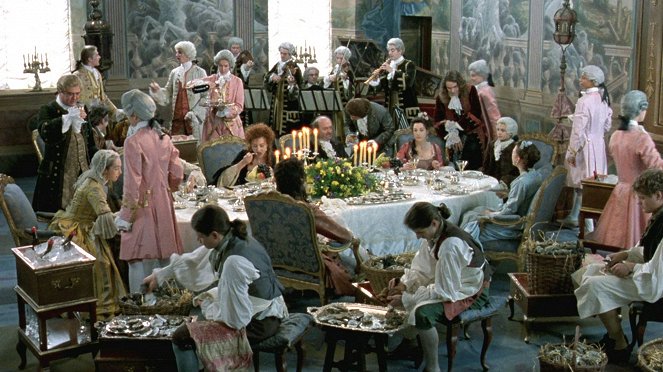Réalisation:
Gérard CorbiauPhotographie:
Walther Vanden EndeActeurs·trices:
Stefano Dionisi, Enrico Lo Verso, Elsa Zylberstein, Caroline Cellier, Marianne Basler, Jacques Boudet, Pier Paolo Capponi, Delphine Zentout (plus)Résumés(1)
L'artiste-interprète connue sous le nom de Farinelli, né Carlo Broschi, était célèbre au 18ème siècle comme le plus grand castrat du monde, un chanteur dont les testicules ont été enlevés dans l'enfance pour qu'il conserve la voix haute et claire d'un enfant tout en acquérant le contrôle et le pouvoir d'un chanteur adulte. Chanteur étonnamment doué d'une gamme de plus de trois octaves, il n'a été donné d'autre choix à Farinelli que de sacrifier sa virilité en échange de son art. Sa carrière, fondée sur cette chirurgie qui a restreint considérablement sa vie hors scène, a été à son tour, cerné par sa famille. Dès le début, le père de Carlo, a déclaré qu'il ne doit chanter que les chansons de son frère Riccardo et, tandis que la gloire de Farinelli donne à la carrière Riccardo le coup de pouce nécessaire, la médiocrité de ses compositions retient Farinelli. Quand le chanteur a la possibilité de travailler avec le grand compositeur Haendel, la jalousie de son frère et ses mésalliances concernant ses choix de carrière se dressent sur son chemin. Le partenariat des frères souvent controversé, s'étend également à la chambre à coucher. Tandis que les performances vocales de Farinelli enflamment les femmes, il est physiquement incapable de les satisfaire sexuellement. Alors il fournit les préliminaires dans un étrange jeu de séduction et offre ses conquêtes à son frère. (Le Pacte)
(plus)Critiques (3)
Farinelli was a real historical figure, a singer who had been castrated, giving his voice a colour that men are otherwise incapable of. A singer whose performances made women swoon. An extraordinary voice and an extraordinary costume drama that can only be recommended. By the way, Farinelli's voice in the film was created by digitally mixing a female and a male operatic voice to achieve the desired result.
()
“Without him you nothing but... silence." Brotherly love preventing the unleashing of exceptional talent. Unrecognized genius, Georg Friedrich Händel, knows the situation well. That’s right, this has very little to do with reality. Probably about as much as Forman’s adaptation of Mozart’s life and times. Which changes nothing about the cinematic qualities of Farinelli. But this entire picture suffers rather in the shadow of Amadeus. Although Farinelli was made ten years later, it has the same template. And it still works outstandingly. Just on a slightly lower level. The reason for this is neither the screenplay, nor the actors nor production design and certainly not the music, but simply the absence of unforgettable scenes. It is “only" darn good, but it would have to be unforgettable to be an exceptional work.
()
I have to admit that I enjoyed Corbiau's film The King Is Dancing a lot more, both in terms of my tastes and mood. While Farinelli is able to offer the elegance of aristocrats in period costumes, the baroque splendor of palaces, and the luxury of residences from that time, it somehow fails to offer a captivating story worthy of Forman's Amadeus. It's more of a case of aesthetic boredom that longs for some festival excitement. Fans of classical music and opera singing may give it an extra star, but I must once again mention Amadeus which managed to present classical music to today's audience much more effectively. Overall impression: 50%.
()

